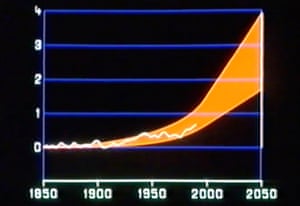Extract from The Guardian
Public
information film unseen for years shows Shell had clear grasp of
global warming 26 years ago but has not acted accordingly since, say
critics
Damian
Carrington and Jelmer Mommers
Tuesday
28 February 2017 16.45 AEDT
The
oil giant Shell issued a stark warning of the catastrophic risks of
climate change more than a quarter of century ago in a prescient 1991
film that has been rediscovered.
However,
since then the company has invested heavily in highly polluting oil
reserves and helped lobby against climate action, leading to
accusations that Shell knew the grave risks of global warming but did
not act accordingly.
Shell’s
28-minute film, called Climate of Concern, was made for public
viewing, particularly in schools and universities. It warned of
extreme weather, floods, famines and climate refugees as fossil fuel
burning warmed the world. The serious warning was “endorsed by a
uniquely broad consensus of scientists in their report to the United
Nations at the end of 1990”, the film noted.
“If
the weather machine were to be wound up to such new levels of energy,
no country would remain unaffected,” it says. “Global warming is
not yet certain, but many think that to wait for final proof would be
irresponsible. Action now is seen as the only safe insurance.”
A
separate 1986 report, marked “confidential” and also seen by the
Guardian, notes the large uncertainties in climate science at the
time but nonetheless states: “The changes may be the greatest in
recorded history.”
The
predictions in the 1991 film for temperature and sea level rises and
their impacts were remarkably accurate, according to scientists, and
Shell was one of the first major oil companies to accept the reality
and dangers of climate change.
But,
despite this early and clear-eyed view of the risks of global
warming, Shell invested many billions of dollars in highly polluting
tar sand operations and on exploration in the Arctic. It also cited
fracking as a “future
opportunity” in 2016, despite its
own 1998 data showing exploitation of unconventional oil and
gas was incompatible with climate goals.
The
projections for future global warming in Shell’s 1991 film stand up
“pretty well” today, according to Prof Tom Wigley. Photograph:
Climate of ConcernThe film was obtained by the
Correspondent, a Dutch online journalism platform, and shared
with the Guardian, and lauds commercial-scale solar and wind power
that already existed in 1991. Shell has recently lobbied successfully
to undermine
European renewable energy targets and is estimated to have
spent $22m
in 2015 lobbying against climate policies. The company’s
investments in low-carbon energy have been minimal compared to
its fossil
fuel investments.Shell has also been a member of industry lobby
groups that have fought climate action, including the so-called
Global Climate
Coalition
until 1998; the far-right American
Legislative Exchange Council (Alec) until 2015; and remains
a member of the Business Roundtable and the American Petroleum
Institute today.Another oil giant, Exxon
Mobil, is under investigation by the US Securities and Exchange
Commission and state attorney generals for allegedly misleading
investors about the risks climate change posed to its business. The
company said they are confident they are compliant. In early 2016, a
group of congressmen
asked the Department of Justice to also “investigate
whether Shell’s actions around climate change violated federal
law”.“They knew. Shell told the public the truth about climate
change in 1991 and they clearly never got round to telling their own
board of directors,” said Tom Burke at the green thinktank E3G, who
was a member of Shell’s external review committee from 2012-14 and
has also advised BP and the mining giant Rio Tinto. “Shell’s
behaviour now is risky for the climate but it is also risky for their
shareholders. It is very difficult to explain why they are continuing
to explore and develop high-cost reserves.”Bill McKibben, a leading
US environmentalist, said: “The fact that Shell understood all this
in 1991, and that a quarter-century later it was trying to open up
the Arctic to oil-drilling, tells you all you’ll ever need to know
about the corporate ethic of the fossil fuel industry. Shell made a
big difference in the world – a difference for the worse.”Prof
Tom Wigley, the climate scientist who was head of the Climate
Research Unit at the University of East Anglia when it helped Shell
with the 1991 film, said: “It’s one of the best little films that
I have seen on climate change ever. One could show this today and
almost all would still be relevant.” He said Shell’s actions
since 1991 had “absolutely not” been consistent with the film’s
warning.A Shell spokeswoman said:
“Our
position on climate change is well known; recognising the climate
challenge and the role energy has in enabling a decent quality of
life. Shell continues to call for effective policy to support lower
carbon business and consumer choices and opportunities such as
government lead carbon pricing/trading schemes.“Today, Shell
applies a $40 per tonne of CO2 internal project screening value to
project decision-making and has developed leadership positions in
natural gas and sugarcane ethanol; the lowest carbon hydrocarbon and
biofuel respectively,” she said.Patricia Espinosa, the UN’s
climate change chief, said change by the big oil companies was vital
to tackling global warming. “They are a big part of the global
economy, so if we do not get them on board, we will not be able to
achieve this transformation of the economy we need,” she said.The
investments the oil majors are making in clean energy are, Espinosa
said, “very small, the activities in which they are engaging are
still small and do not have the impact that we really need.”Espinosa,
who visited Shell’s headquarters in the Hague in December, said:
“They are clear that this [climate change] agenda has to do with
the future of their company and that business as usual, not doing
anything, will lead to crisis and losses in their business.”

No comments:
Post a Comment